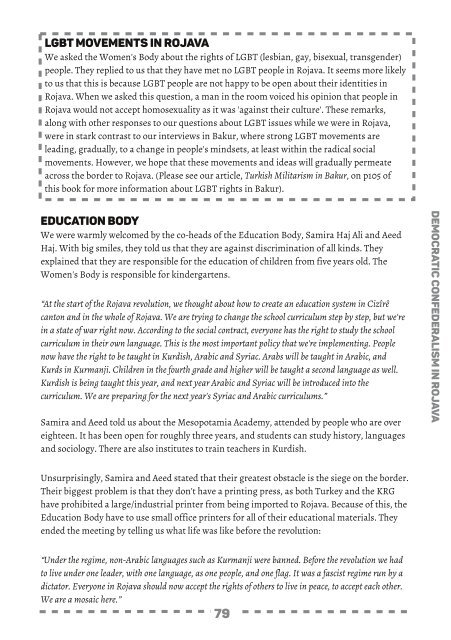STRUGGLES
Struggles-for-autonomy-in-Kurdistan
Struggles-for-autonomy-in-Kurdistan
Create successful ePaper yourself
Turn your PDF publications into a flip-book with our unique Google optimized e-Paper software.
LGBT movements in Rojava<br />
We asked the Women's Body about the rights ofLGBT (lesbian, gay, bisexual, transgender)<br />
people. They replied to us that they have met no LGBT people in Rojava. It seems more likely<br />
to us that this is because LGBT people are not happy to be open about their identities in<br />
Rojava. When we asked this question, a man in the room voiced his opinion that people in<br />
Rojava would not accept homosexuality as it was 'against their culture'. These remarks,<br />
along with other responses to our questions about LGBT issues while we were in Rojava,<br />
were in stark contrast to our interviews in Bakur, where strong LGBT movements are<br />
leading, gradually, to a change in people's mindsets, at least within the radical social<br />
movements. However, we hope that these movements and ideas will gradually permeate<br />
across the border to Rojava. (Please see our article, Turkish Militarism in Bakur, on p105 of<br />
this book for more information about LGBT rights in Bakur).<br />
Education Body<br />
We were warmly welcomed by the co-heads ofthe Education Body, Samira Haj Ali and Aeed<br />
Haj. With big smiles, they told us that they are against discrimination ofall kinds. They<br />
explained that they are responsible for the education ofchildren from five years old. The<br />
Women's Body is responsible for kindergartens.<br />
“At the start ofthe Rojava revolution, we thought about how to create an education system in Cizîrê<br />
canton and in the whole ofRojava. We are trying to change the school curriculum step by step, but we're<br />
in a state ofwar right now. According to the social contract, everyone has the right to study the school<br />
curriculum in their own language. This is the most important policy that we're implementing. People<br />
now have the right to be taught in Kurdish, Arabic and Syriac. Arabs will be taught in Arabic, and<br />
Kurds in Kurmanji. Children in the fourth grade and higher will be taught a second language as well.<br />
Kurdish is being taught this year, and next year Arabic and Syriac will be introduced into the<br />
curriculum. We are preparing for the next year's Syriac and Arabic curriculums.”<br />
Samira and Aeed told us about the Mesopotamia Academy, attended by people who are over<br />
eighteen. It has been open for roughly three years, and students can study history, languages<br />
and sociology. There are also institutes to train teachers in Kurdish.<br />
democratic confederalism in rojava<br />
Unsurprisingly, Samira and Aeed stated that their greatest obstacle is the siege on the border.<br />
Their biggest problem is that they don't have a printing press, as both Turkey and the KRG<br />
have prohibited a large/industrial printer from being imported to Rojava. Because ofthis, the<br />
Education Body have to use small office printers for all oftheir educational materials. They<br />
ended the meeting by telling us what life was like before the revolution:<br />
“Under the regime, non-Arabic languages such as Kurmanji were banned. Before the revolution we had<br />
to live under one leader, with one language, as one people, and one flag. It was a fascist regime run by a<br />
dictator. Everyone in Rojava should now accept the rights ofothers to live in peace, to accept each other.<br />
We are a mosaic here.”<br />
79


